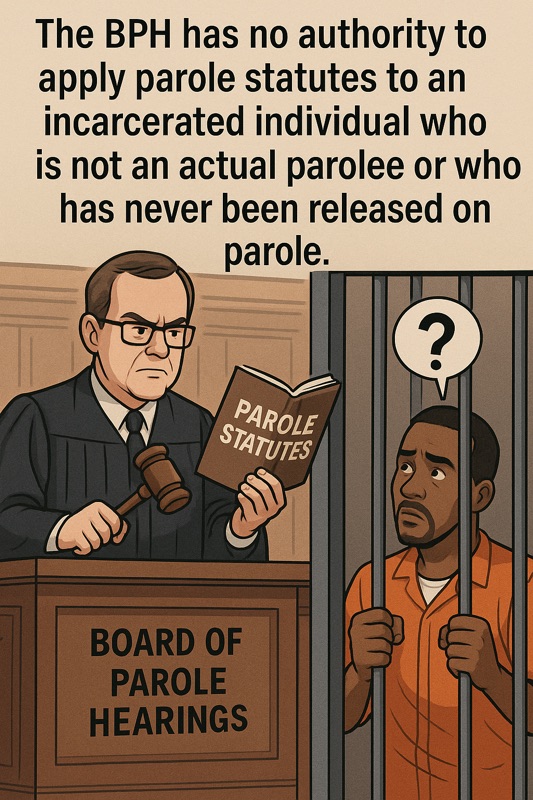
The Parole Power Illusion: How the BPH Violates Its Own Jurisdiction
By Devon T. White
For decades, California’s Board of Parole Hearings (BPH) has operated under a dangerous illusion — that it can apply parole statutes to people who have never been released on parole. This quiet but catastrophic overreach has trapped thousands inside an unlawful system of double custody. The truth, grounded in law and logic, is simple: the BPH has no authority over anyone who is not an actual parolee.
The Law Speaks Clearly
Under Penal Code § 3000(a)(1), parole supervision begins only after a person has been released from their determinate term. Until that release occurs, an individual remains under CDCR’s physical custody, not the BPH’s constructive custody.
Penal Code § 669 separates these two jurisdictions:
- The Determinate Term governs physical imprisonment within the institution.
- The Indeterminate Term (Parole) governs constructive custody after release.
Once a person completes their determinate sentence, they must be released to parole supervision—or discharged entirely. The law never authorizes the BPH to hold or classify someone as a parolee before release. Yet that is exactly what the BPH has done.
Jurisdictional Trespass and Constitutional Violations
When the BPH conducts hearings or imposes parole statutes on people who have never been paroled, it commits a series of constitutional violations:
- Due Process Violation (14th Amendment): Applying parole procedures without jurisdiction denies lawful process.
- Separation-of-Powers Breach (Cal. Const. Art. III): The BPH assumes powers reserved for the courts, converting administrative hearings into unlawful sentencing extensions.
- False Imprisonment (Penal Code § 15): A person cannot be confined without a valid judgment and lawful penalty tied to an active public offense.
- Fraudulent Administration: By using parole statutes to justify continued confinement, the BPH manufactures authority — and profit — through extended custody programs, violating the public trust.
The Human and Fiscal Toll
This misconduct is not theoretical; it’s personal. Men and women remain locked away under constructive custody that never lawfully began. The BPH holds hearings to “grant” or “deny” parole to people who were never released in the first place. That’s not rehabilitation — it’s jurisdictional racketeering.
Each extra day in unlawful custody means more taxpayer dollars spent on illegal detainment, more families broken, and more faith lost in a system sworn to uphold justice. The tragedy lies not just in confinement but in institutional denial — officials pretending that oversight is reform when reform begins with accountability.
The BPH’s True Role
The BPH’s legal mandate is narrow and unambiguous:
“To grant discharge from parole to those who have successfully completed their supervision.”
Nothing more. The Board’s purpose is to release, not to impose. It cannot “put” someone on parole. It cannot initiate supervision over a person still in physical custody. Once the determinate term ends, CDCR’s jurisdiction to imprison ends with it — and any continued restraint becomes void.
A Call for Correction and Courage
This revelation demands more than awareness — it requires action.
Oversight agencies, lawmakers, and the people of California must confront the BPH’s unlawful assumption of power. The record is clear, the statutes unambiguous, and the violations undeniable.
Justice begins when truth is spoken without fear:
The BPH has no authority over those who have never been released to parole.
Every unlawful hearing, every day of false custody, and every signature on a void judgment is part of a broader constitutional crisis.
It’s time to end the illusion — and restore the law to its rightful place.


Comments
Post a Comment